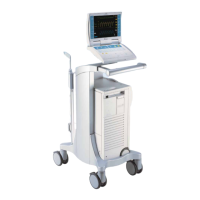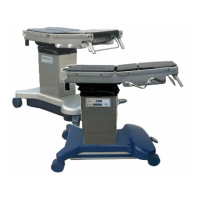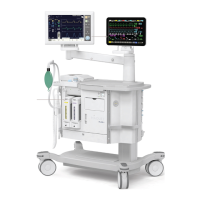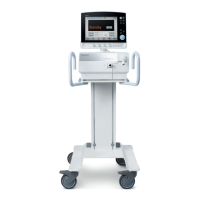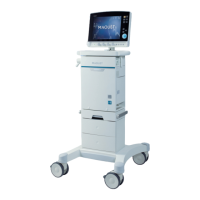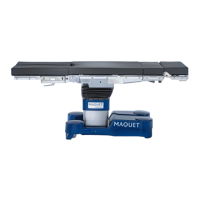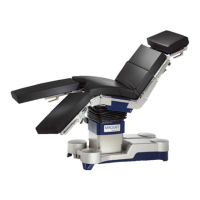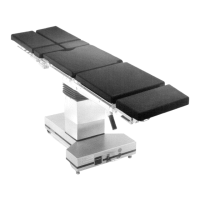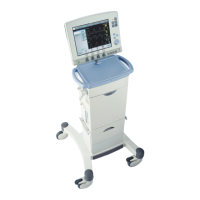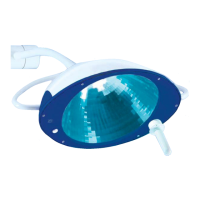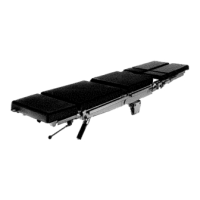Do you have a question about the Maquet Datascope CS300 and is the answer not in the manual?
General safety information including warnings, precautions, and notes for device usage.
Critical safety alerts regarding hazardous materials and maintenance procedures.
Cautions regarding component handling, troubleshooting, and cover removal.
General information on product improvement, changes to materials, and specifications.
Explains the purpose of block diagrams for understanding instrument organization and locating malfunctions.
Details on power supply, sensor module, front end, main board, display, solenoid, keypad, video, and sensor module functions.
Details on ECG, Pressure, Data Acquisition, and Microcontroller functions of the Front End.
Details on the 6809, 68020, and 68HC711 microprocessors, and shared RAM.
Describes the Display Controller's role in generating system display and transmitting video data.
Explains the Solenoid Driver's function in energizing solenoids and controlling Peltier devices.
Details the Keypad Controller's function scanning keys, controlling LEDs, and passing video interface data.
Describes the Video Receiver's role in managing local video memory and controlling the display panel.
Explains the Sensor Module's function in converting optical signals to pressure signals and processing data.
Introduces the chapter on performing repairs, emphasizing understanding instrument functions and theory.
Safety guidelines to observe when instrument covers are removed, including handling components.
General advice on identifying problems through understanding instrument features and theory of operation.
Steps for identifying problems, avoiding component shorts, using proper equipment, and cleaning repair areas.
Lists essential test equipment and special tools needed for troubleshooting and calibration.
Lists error codes from 68020 and 6809 CPUs, aiding in diagnosing system failures.
Explains the function of the S2 DIP switch for configuring default settings for the 68020 processor.
Information on configuring language, date format, modem, display, filter, RS232, and sensor module.
Describes the user interface for Service Diagnostics, including key inputs and a warning screen.
Displays the main menu of the Service Diagnostics software for selecting various tests.
Explains the schematic representation of the CS300 pneumatics for leak testing and calibration.
Lists and describes pneumatic components (solenoids, regulators, transducers) used in diagnostics.
Details the procedure for verifying the operation of the display and associated interconnecting cables.
Verifies the operation of front panel switches and keypad LEDs.
Tests the integrity of the RS-232 channel by testing serial communication.
Checks the integrity of the internal modem using its built-in diagnostic test.
Verifies the functionality of the system recorder by printing waveforms, grids, and characters.
Details the Volume Test, noting it's for engineering purposes only and should not be conducted.
Performs leak tests on the Safety Disk and its associated protection circuitry.
Checks for leaks in the drive section of the pneumatics.
Checks for obstructions in the Safety Vent path, potentially caused by K6A failure or kinked tubing.
Verifies system performance by checking pressure, vacuum, and transition times.
Verifies motor speed circuitry, calibration, and actual speed readings.
Calibrates the helium pressure circuit by checking helium offset.
Verifies lamp function, output, PWM, signal count, and signal level of the Sensor Module.
Allows viewing of the event log, including fault numbers and occurrences, and printing the fault log.
Details the event log stored in non-volatile RAM, showing fault numbers and occurrence counts.
Displays time, date, and detailed information on the last 20 faults, particularly Autofill failures.
Shows the last 20 power-up self-test failures.
Displays the last 20 trigger modes.
Shows system information like pump cycle count, assist time, and battery statistics.
Displays the software revision levels for the CS300.
Step-by-step instructions for removing the Pneumatic Assembly from the system.
Instructions for disassembling the Pneumatic Assembly, primarily for reservoir replacement.
Detailed steps for reassembling the pneumatic assembly, including required parts.
Instructions to check the helium system for leaks before proceeding with yoke extension removal.
Steps for removing the rear panel cover, including retaining screws for reassembly.
Procedure for removing the yoke and yoke extender from the helium regulator assembly.
Information on identifying replacement parts and assemblies for the instrument.
Lists parts divided into chassis-mounted components and other assemblies.
Notes product variations based on line voltages requiring different components.
Details Datascope's exchange policy for printed circuit board assemblies.
Information on obtaining current prices and exchange charges.
Guidelines for ordering replacement parts and assemblies from Datascope Corp.
Lists abbreviations used in parts listings and throughout the manual.
Provides visual identification of parts through isometric drawings and lists.
Lists parts and their corresponding figure numbers and part numbers for the chassis.
Lists chassis parts with part numbers for various languages (Spanish, German, French, Italian).
Lists parts and their corresponding figure numbers and part numbers for the monitor module.
Lists monitor module parts with part numbers for various languages.
Lists parts and their corresponding figure numbers and Datascope part numbers for the compressor assembly.
Lists parts and their corresponding figure numbers and part numbers for the cart assembly.
Identifies the mobilizer and docking station components of the Universal Transport System.
Provides information on properly testing and calibrating the CS300 using test equipment.
General guidelines and warnings for calibration, including safety precautions and required tools.
Lists essential test equipment and special tools needed for calibration.
Recommends understanding CS300 operation before attempting calibration.
Steps for initial setup, including powering on and accessing the electronics panel.
Explains how to interpret power-up self-test results and reset default settings.
Details how to enter Service Diagnostics mode and its user interface.
Describes the user interface for Service Diagnostics, including key inputs and a warning screen.
Verifies voltages, battery charging, and battery operation.
Notes the reading on the Timer prior to the start of calibration.
Details connecting a DVM to test and adjust reference voltages.
Checks transducer offset values and indicates when calibration is required.
Calibration procedure for the balloon (shuttle) transducer using a digital manometer.
Calibrates the atmospheric transducer using a digital manometer and calculated absolute atmospheric pressure.
Calibrates the drive transducer by adjusting gain and offset values.
Performs leak tests on the Safety Disk and its associated protection circuitry.
Checks for leaks in the drive section of the pneumatics.
Checks pressure readings and verifies regulator settings.
Calibrates the autofill process, ensuring correct helium volume and sensor adjustment.
Verifies blood detect circuitry and checks voltage readings on the solenoid driver board.
Verifies lamp function, output, PWM, signal count, and signal level of the Sensor Module.
Calibrates the ECG gain by adjusting a potentiometer.
Calibrates blood pressure gain by adjusting a potentiometer.
Verifies the operation of front panel switches and keypad LEDs.
Tests the integrity of the RS-232 channel.
Checks the integrity of the internal modem.
Verifies the functionality of the system recorder.
Verifies motor speed circuitry, calibration, and actual speed readings.
Calibrates the helium pressure circuit.
Checks system performance by verifying pressure, vacuum, and transition times.
Checks blood pressure channel functionality, including triggering and augmentation.
Verifies ECG signal display, lead selection, and trigger modes.
Checks user preferences, audio settings, and printer output options.
Verifies system pumping operation, autofill, and IAB status indicators.
Checks battery operation and charging indicators.
Verifies the function of the manual fill valve.
Verifies elapsed time on the hour meter.
Checks helium pressure and detects potential gas leaks.
Verifies the operation of cooling fans.
Measures leakage current from the chassis to ground under various conditions.
Measures sink current from the patient circuit to ground.
Measures the resistance from the case ground lug to the AC line cord.
Shows locations of test points on Solenoid Driver, Main, and Front End boards for calibration.
Provides guidelines for performing preventive maintenance to enhance equipment reliability.
Lists parts included in the 2500 and 5000-hour maintenance kits.
Recommends contents for a log book to track maintenance and evaluate reliability.
Outlines maintenance actions required on a schedule, categorized by user.
Maintenance actions for clinical users or BMETs, not requiring tools.
Maintenance actions for BMETs, requiring tools and potential cover removal.
Checklists for visual inspection of the unit, components, and assemblies.
Routine visual inspection checklist for unit appearance, cords, controls, safety disk, fans, and Doppler.
In-depth visual inspection for pneumatic, fill/purge, motor compartments, and electronics panel.
Procedure to remove water from tubing, minimizing operation difficulties.
Provides instructions for accessing and replacing various components and assemblies.
Instructions for replacing pump diaphragms, pressure head, and vacuum head.
Procedure for replacing the pump muffler.
Instructions for replacing the pneumatic filter element.
Instructions for inspecting and replacing shock mounts and tubing.
Procedure for replacing rechargeable batteries, recommended every 3 years or if performance is marginal.
Instructions for replacing the purge line filter.
Cleaning the power supply input to prevent airflow restriction.
Cleaning the Fiber Optic Sensor and Ferrules for accurate readings.
Cleaning the optical receptacle using compressed air and cleaning fluid.
Instructions for replacing the fiber optic lamps in the assembly.
| Power Requirements | 100-240 VAC, 50/60 Hz |
|---|---|
| Device Type | IABP |
| Type | Intra-Aortic Balloon Pump |
| Display | 10.4 inch color TFT LCD |
| Battery Life/Runtime | Approximately 90 minutes |
| ECG Channels | 3-lead ECG |
| Balloon Volume | 40cc, 50cc |
| Trigger Modes | ECG, Pressure, Pacer |
| Power Source | AC Power, Internal Battery |
| Compatibility | Compatible with intra-aortic balloons |
| Alarms | Audio and visual alarms for high/low pressure, gas supply, and other parameters |
